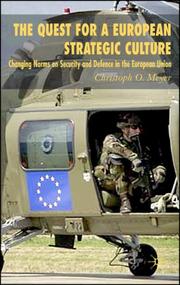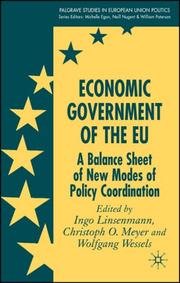| Listing 1 - 6 of 6 |
Sort by
|

ISBN: 1403992800 1349543721 9786613185785 0230598218 1283185784 9781403992802 Year: 2006 Publisher: New York: Palgrave MacMillan,
Abstract | Keywords | Export | Availability | Bookmark
 Loading...
Loading...Choose an application
- Reference Manager
- EndNote
- RefWorks (Direct export to RefWorks)
The topical study investigates whether strategic norms and beliefs held in different countries have become more similar since 1989 and explores the implications for the viability of a common European Security and Defence Policy. The author argues that national strategic cultures, although distinct, have been subject to three learning mechanisms since 1989: changing threat perceptions, institutional socialisation, and mediatised crises learning. The empirical evidence emerging from various sources shows that some key norms underpinning national strategic cultures have changed substantially, opening opportunities for deeper defence cooperation in Europe.
National security --- European Union --- Armed Forces --- Military policy --- Defenses --- Europe --- Strategic culture --- Armed Forces. --- Defenses. --- Military policy. --- National security - Europe --- Europe - Defenses --- NATIONAL SECURITY -- 327.5
Book
ISBN: 1399505548 139950553X 1399505513 9781399505543 9781399505536 Year: 2022 Publisher: Edinburgh : Edinburgh University Press,
Abstract | Keywords | Export | Availability | Bookmark
 Loading...
Loading...Choose an application
- Reference Manager
- EndNote
- RefWorks (Direct export to RefWorks)
The first comparative study of estimative intelligence and strategic surprise in a European context, complementing and testing insights from previous studies centred on the United States.
This book provides the first assessment of the performance of three leading European polities in providing estimative intelligence during an era of surprise. It develops a new framework for conducting postmortems guided by a normative model of anticipatory foreign policy. The comparative analysis focuses on how the UK, the EU and Germany handled three cases of major surprises: the Arab uprisings, the rise to power of the Islamic State (ISIS), and the Russian annexation of Crimea. It considers not just government intelligence assessments, but also diplomatic reporting and expert open sources and how these assessments were received by organisational leaders. The book tests and develops new theories about the causes of strategic surprises, going beyond a common focus on intelligence versus policy failures to identify challenges and factors that cut across both communities. With the help of former senior officials, the book identifies lessons yet to be learnt by European polities to better anticipate and prepare for future surprises.
POLITICAL SCIENCE / International Relations / General. --- Intelligence service --- History --- Great Britain --- Crimea (Ukraine) --- Germany --- Foreign relations --- Annexation to Russia (Federation) --- European Council --- IS (Organization) --- Since 2000 --- Arab Spring, 2010 --- -Intelligence service --- European Council.
Book
ISBN: 9780230297845 Year: 2011 Publisher: Basingstoke Palgrave Macmillan
Abstract | Keywords | Export | Availability | Bookmark
 Loading...
Loading...Choose an application
- Reference Manager
- EndNote
- RefWorks (Direct export to RefWorks)
Emergency management --- Risk assessment --- Risk --- Forecasting

ISBN: 1403935807 9781403935809 1349518190 9786610825998 1280825995 023062572X Year: 2007 Publisher: Basingstoke Palgrave
Abstract | Keywords | Export | Availability | Bookmark
 Loading...
Loading...Choose an application
- Reference Manager
- EndNote
- RefWorks (Direct export to RefWorks)
Government --- International economic relations --- Economic policy and planning (general) --- European Union --- 334.151.1 --- EEC / European Union - EU -Europese Unie - Union Européenne - UE --- 337.142 --- EG : economisch en monetair beleid. --- European Union countries --- -European Union countries --- -EU countries --- Euroland --- Europe --- Economic integration --- Politics and government --- -Economic integration --- EG : economisch en monetair beleid
Book
ISBN: 1108640206 1108644007 110848607X 1108639941 9781108639941 9781108640206 9781108644006 Year: 2020 Publisher: Cambridge : Cambridge University Press,
Abstract | Keywords | Export | Availability | Bookmark
 Loading...
Loading...Choose an application
- Reference Manager
- EndNote
- RefWorks (Direct export to RefWorks)
What does it take for warnings about violent conflict and war to be listened to, believed and acted upon? Why are warnings from some sources noticed and largely accepted, while others are ignored or disbelieved? These questions are central to considering the feasibility of preventing harm to the economic and security interests of states. Challenging conventional accounts that tend to blame decision-makers' lack of receptivity and political will, the authors offer a new theoretical framework explaining how distinct 'paths of persuasion' are shaped by a select number of factors, including conflict characteristics, political contexts, and source-recipient relations. This is the first study to systematically integrate persuasion attempts by analysts, diplomats and senior officials with those by journalists and NGO staff. Its ambitious comparative design encompasses three states (the US, UK, and Germany) and international organisations (the UN, EU, and OSCE) and looks in depth at four conflict cases: Rwanda (1994), Darfur (2003), Georgia (2008) and Ukraine (2014).
War --- Armed conflict (War) --- Conflict, Armed (War) --- Fighting --- Hostilities --- Wars --- International relations --- Military art and science --- Causes of war --- Forecasting. --- Causes. --- Prevention --- International cooperation.
Book
ISBN: 9781108486071 9781108713931 9781108644006 Year: 2020 Publisher: Cambridge Cambridge University Press
Abstract | Keywords | Export | Availability | Bookmark
 Loading...
Loading...Choose an application
- Reference Manager
- EndNote
- RefWorks (Direct export to RefWorks)
| Listing 1 - 6 of 6 |
Sort by
|

 Search
Search Feedback
Feedback About UniCat
About UniCat  Help
Help News
News